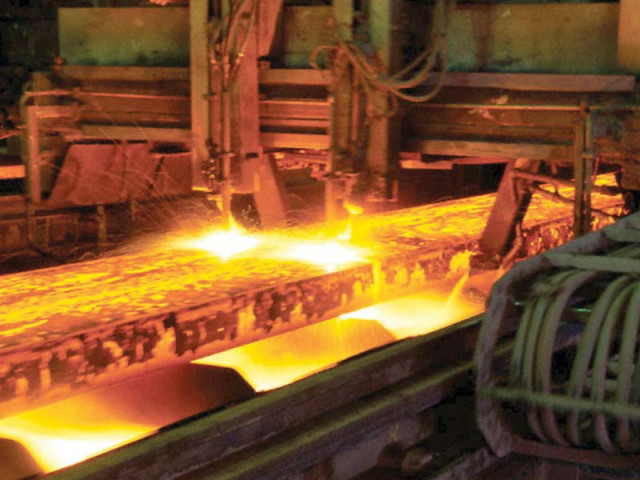Name change for Tuwairqi okayed
It comes despite pending litigation in international court of arbitration

Despite pending litigation in the international court of arbitration and the objection raised by the Law Division, the caretaker government has granted in-principle approval for changing the name of Tuwairqi Steel Mills Limited to National Steel Complex Limited.
However, the approval is subject to endorsement by the Law Division.
In a summary moved by the Ministry of Industries and Production, it was claimed that the Law Division had endorsed the proposal of changing the name of Tuwairqi Steel Mills to National Steel Complex.
However, during a recent meeting of the Economic Coordination Committee (ECC), it was pointed out that the Law Division had not yet endorsed the proposal.
The Ministry of Industries told the ECC that Tuwairqi Steel Mills, a subsidiary of Al-Tuwairqi Group of Companies of Saudi Arabia, was notified as a unit of the Export Processing Zone (EPZ) on October 15, 2005.
Tuwairqi Steel started production in early 2013 but it went into shutdown mode in September 2013 due to financial losses and asked the government of Pakistan to announce a concessionary gas tariff, which was not granted. Later, the Al-Tuwairqi Group went to the Permanent Court of Arbitration in The Hague. The case is pending final adjudication.
Meanwhile, Tuwairqi Steel requested for the change of its name to National Steel Complex. The Export Processing Zone Authority (EPZA) and the Securities and Exchange Commission of Pakistan (SECP) did not object to the request.
The Ministry of Industries claimed that the Ministry of Law also endorsed the proposal and requested the ECC to approve the change of name, as proposed in the summary. During discussion, it was pointed out that the Law Division, through its letter attached with the summary, did not endorse the change of name. It rather advised the Ministry of Industries to examine the proposal from the policy perspective and in light of the Implementation Agreement.
The ECC considered the summary submitted by the Ministry of Industries, titled “Change of name from Tuwairqi Steel Mills Ltd to National Steel Complex Ltd” and approved the proposal, in principle, subject to endorsement by the Law Division.
Tuwairqi Steel, set up through foreign direct investment by the Al-Tuwairqi Group in collaboration with a South Korean firm, was established on a sprawling 220-acre site at Bin Qasim, Karachi. The Saudi firm ceased operations at the plant when then Pakistan Muslim League-Nawaz (PML-N) government turned down the request for gas provision at a discounted rate.
Originally, Tuwairqi Steel had ambitious plans to become Pakistan’s largest steel complex with production capacity of 1.28 million tons per annum. However, its Direct Reduced Iron (DRI) plant stopped running for several months in 2014 owing to a dispute over gas supply.
Phase-I of the DRI plant had been completed at a cost of $340 million while phase-II and phase-III were expected to receive a capital injection in the range of $850 to $900 million, contingent on the commercial success of the DRI plant.
Tuwairqi Steel management requested for gas supply at a tariff of Rs123 per million British thermal units (mmBtu) to ensure effective plant operations. However, the government refused, citing concerns over a huge subsidy of Rs25 billion over five years.
The Finance Division and the Ministry of Petroleum also opposed the proposal, asserting that the government had no legal obligation to provide gas at a concessionary rate.
The Saudi Arabian ambassador got engaged in discussions with then finance minister Ishaq Dar in an attempt to find a solution but the government remained unyielding.
Officials noted that a lobby within Pakistan allegedly worked to prevent a resolution as it aimed to acquire the Tuwairqi Steel plant.
In November 2014, at a press conference, then Al-Tuwairqi Holdings chairman Dr Hilal Hussain Al-Tuwairqi cautioned that the mill could cease operations if the promised discounted gas supply was not provided.
To resolve the issue, the company even offered to transfer 15% (126 million) shares of the mill to the government without any payment in exchange for gas supply. Subsequently, the company increased the offer to 17% shares.
In May 2004, a memorandum of understanding (MoU) had been signed with Pakistan, which stipulated that the government would ensure equitable access to gas as fuel and feedstock.
Tuwairqi Steel management contended that they had been assured of gas supply at a reduced tariff to facilitate their competitiveness in the international market. The Ministry of Industries also recommended a tariff of Rs123 per mmBtu for a five-year period.
However, the Ministry of Petroleum cautioned that the reduced tariff would have a financial impact of approximately Rs5 billion on Sui Southern Gas Company, which would necessitate a 3.3% increase in gas prices for all consumers, except for domestic and fertiliser sectors.
Published in The Express Tribune, October 11th, 2023.
Like Business on Facebook, follow @TribuneBiz on Twitter to stay informed and join in the conversation.



















COMMENTS
Comments are moderated and generally will be posted if they are on-topic and not abusive.
For more information, please see our Comments FAQ